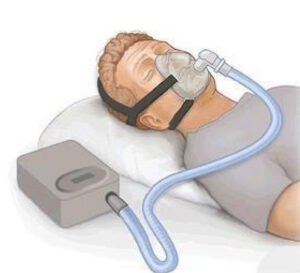Patients with MSA can develop breathing problems as their disease progresses. These can include obstructive sleep apnea, low oxygenation, breathlessness and stridor. Stridor, or a high-pitched wheezing sound heard on inspiration, occurs in up to 40% of MSA patients and may be a predictor of poor disease outcome. Stridor occurs as a result of overactive vocal cord muscles that fail to relax normally during inspiration. It can occur any time of the day, but when it occurs during sleep can result in obstructive sleep apnea, which involves frequent periods during sleep when breathing stops. Breathing problems during sleep has been reported in 15%-37% of MSA patients.
1. Non-Pharmaceutical treatment of breathing problems
-

The primary treatment of sleep apnea is the use of continuous positive airway pressure (CPAP) for patients with mild to moderate stridor and can be useful for symptomatic control, although its impact on survival is unclear. CPAP does not have good adherence by patients as MSA progresses due to discomfort.
- Tracheostomy is the recommended treatment for persistent and severe stridor and can be used in patients with advanced disease for stridor during wakefulness.
2. Medications for the treatment of breathing problems
- Botulinum toxin injected into the vocal cords has been studied as a treatment of stridor in MSA patients, but there is not enough evidence to be recommended.
- Selective serotonin reuptake inhibitors (SSRIs) have been thought to improve sleep disturbances in MSA, as serotonin induces sleep and throat relaxation during sleep. The combination of ondansetron and fluoxetine has been shown to reduce the severity of sleep apnea, but recent studies have found no difference in survival in MSA patients on an SSRI but was associated with higher rates of Parkinsonism and falls.
- Cortelli P, Calandra-Buonaura G, Benarroch EE, et al. Stridor in multiple system atrophy: Consensus statement on diagnosis, prognosis, and treatment. Neurology. 2019;93(14):630–639.
- Iranzo A. Sleep and breathing in multiple system atrophy. Curr Treat Options Neurol. 2007;9(5):347–353.
- Ghorayeb I, et al. Continuous positive airway pressure for sleep-related breathing disorders in multiple system atrophy: long-term acceptance. Sleep Medicine. 2005;6(4):359-362.
- Coon EA, Ahlskog JE, Silber MH, et al. Do selective serotonin reuptake inhibitors improve survival in multiple system atrophy?. Parkinsonism Relat Disord. 2018;48:51–53.

